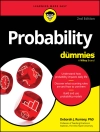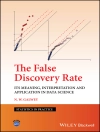How to conduct clinical trials in an ethical and scientificallyresponsible manner
This book presents a methodology for clinical trials that producesimproved health outcomes for patients while obtaining sound andunambiguous scientific data. It centers around a real-world testcase–involving a treatment for hypertension after open heartsurgery–and explains how to use Bayesian methods to accommodateboth ethical and scientific imperatives.
The book grew out of the direct involvement in the project by adiverse group of experts in medicine, statistics, philosophy, andthe law. Not only do they contribute essays on the scientific, technological, legal, and ethical aspects of clinical trials, butthey also critique and debate each other’s opinions, creating aninteresting, personalized text.
Bayesian Methods and Ethics in a Clinical Trial Design
* Answers commonly raised questions about Bayesian methods
* Describes the advantages and disadvantages of this methodcompared with other methods
* Applies current ethical theory to a particular class of designfor clinical trials
* Discusses issues of informed consent and how to serve a patient’sbest interest while still obtaining uncontaminated scientific data
* Shows how to use Bayesian probabilistic methods to createcomputer models from elicited prior opinions of medical experts onthe best treatment for a type of patient
* Contains several chapters on the process, results, andcomputational aspects of the test case in question
* Explores American law and the legal ramifications of using humansubjects
For statisticians and biostatisticians, and for anyone involvedwith medicine and public health, this book provides both apractical guide and a unique perspective on the connection betweentechnological developments, human factors, and some of the largerethical issues of our times.
Tabela de Conteúdo
Partial table of contents:
MAJOR ISSUES.
Ethically Optimizing Clinical Trials (K. Schaffner).
Admissibility of Treatment (N. Sedransk).
TEST CASE: VERAPAMIL/NITROPRUSSIDE.
The Mechanics of Conducting a Clinical Trial (E. Heitmiller &T. Blanck).
Issues of Statistical Design (N. Sedransk).
Operational History and Procedural Feasibility (J. Kadane).
Verapamil versus Nitroprusside: Results of the Clinical Trial I (J.Kadane & N. Sedransk).
Verapamil versus Nitroprusside: Results of the Clinical Trial II(E. Heitmiller, et al.).
OTHER ISSUES.
Author’s Response to Commentaries I and II (D. Kairys).
EPILOGUE.
Epilogue (J. Kadane).
Indexes.
Sobre o autor
JOSEPH B. KADANE is Leonard J. Savage Professor of Statistics and Social Sciences at Carnegie Mellon University. He has published over one hundred papers on statistical theory and applications, edited the book Robustness of Bayesian Analysis, and coedited Statistics and the Law.












